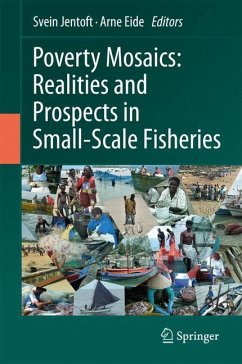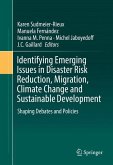Small-scale fisheries are a major source of food and employment around the world. Yet, many small-scale fishers work in conditions that are neither safe nor secure. Millions of them are poor, and often they are socially and politically marginalized. Macro-economic and institutional mechanisms are essential to address these poverty and vulnerability problems; however, interventions at the local community level are also necessary. This requires deep understanding of what poverty means to the fishers, their families and communities; how they cope with it; and the challenges they face to increase resiliency and improve their lives for the better.
This book provides a global perspective, situating small-scale fisheries within the broad academic discourse on poverty, fisheries management and development. In-depth case studies from fifteen countries in Latin America, Europe, South and Southeast Asia, and sub-Saharan Africa, demonstrate the enormously complexecological, economic, social, cultural and political contexts of this sector. Conclusions for policy-making, formulated as a joint statement by the authors, argue that fisheries development, poverty alleviation, and resource management must be integrated within a comprehensive governance approach that also looks beyond fisheries.
The scientific editors, Svein Jentoft and Arne Eide, are both with the Norwegian College of Fishery Science, Faculty of Biosciences, Fisheries and Economics, University of Tromsø, Norway.
This book provides a global perspective, situating small-scale fisheries within the broad academic discourse on poverty, fisheries management and development. In-depth case studies from fifteen countries in Latin America, Europe, South and Southeast Asia, and sub-Saharan Africa, demonstrate the enormously complexecological, economic, social, cultural and political contexts of this sector. Conclusions for policy-making, formulated as a joint statement by the authors, argue that fisheries development, poverty alleviation, and resource management must be integrated within a comprehensive governance approach that also looks beyond fisheries.
The scientific editors, Svein Jentoft and Arne Eide, are both with the Norwegian College of Fishery Science, Faculty of Biosciences, Fisheries and Economics, University of Tromsø, Norway.
From the book reviews:
"The book provides 'a mosaic of small-scale fishers' stories, situations and coping strategies' that will interest many social historians. The authors are sociologists, cultural anthropologists, geographers and interdisciplinary social scientists, rather than historians but most of the case-study-based chapters contain a background chronology which serves as a useful entry point for anyone looking to develop a deeper historical analysis of theses fishing-dependent peoples and regions." (Edward H. Allison, International Journal of Maritime History, June, 2013)
"The book provides 'a mosaic of small-scale fishers' stories, situations and coping strategies' that will interest many social historians. The authors are sociologists, cultural anthropologists, geographers and interdisciplinary social scientists, rather than historians but most of the case-study-based chapters contain a background chronology which serves as a useful entry point for anyone looking to develop a deeper historical analysis of theses fishing-dependent peoples and regions." (Edward H. Allison, International Journal of Maritime History, June, 2013)








